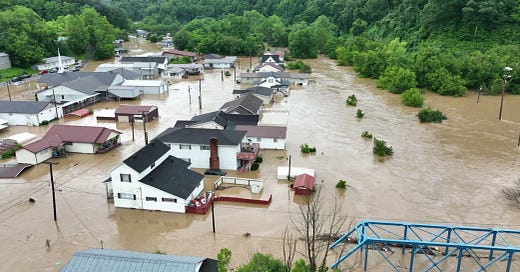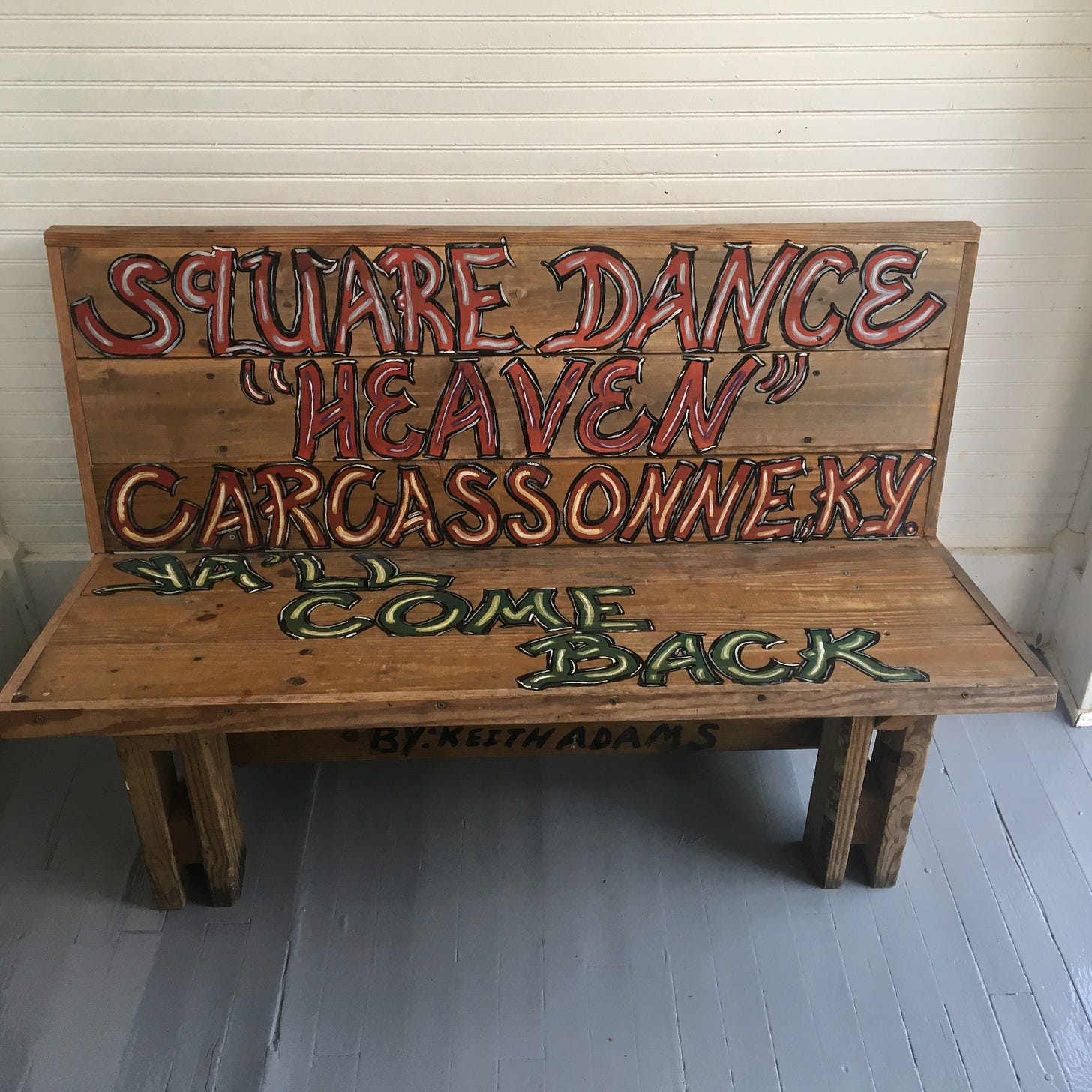Kentucky Spirit ~ An Old Essay and Request for Help
Dear Friends,
The devastation from flooding in Eastern Kentucky has struck a personal chord. My family on my mother’s side are from Whitesburg and the even smaller town of Blackey in Hazard County. I know those mountains well and we’re receiving personal accounts daily from relatives still living there. Everyone we know is safe but they’ve lost a great deal…it’s hard to fathom.
The stories are full of a familiar resilience in the face of loss that has been the ongoing experience of many Appalachian people since before they came to this country and definitely in the generations that have lived since in those remote mountains. The grief of losing what little you have to insurmountable forces, forces of Nature, seemingly cruel and uncaring forces. It’s the kind of life experience that has you shaking your fist at God. I know this gesture well…it lives in my genes. But, along with it comes a fierce determination to survive, resourcefulness, and a turning towards each other. People in these places know we need each other. Community is real there. I highly recommend as you read these accounts, listening to the direct quotes from the people there. They are all about helping their brothers and sisters to safety.
“The relative remoteness of many towns in central Appalachia is a challenge in times like this, but it also fosters a particular kind of self-reliance. As the waters rose on Thursday, neighbors launched into the floodwaters in their boats to find people who needed rescuing.” _NY Times
Reading about the flooding I was reminded of what makes this all the more enraging: mountaintop removal and strip mining. This is a detail of the landscape you can forget from afar, but when you’re there it is all too present. The heartless, greedy, short-sighted scarring of the natural face of these ancient mountains (the oldest mountain range on the planet) by extractive energy mining practices is precisely what makes the flooding so bad. It’s also what’s made the poverty in this region so persistent and the addiction problem so insidious. I feel the shaking of the fist at God is more a shaking the fist at Greed, Power, “Progress” at the expense of people—the helplessness in the face of the machine we built that prizes profit over lives.
“In the mountains of central Appalachia, flooding can be terrifyingly sudden, with water rushing down barren, mine-stripped hillsides or pouring down in summer thunderstorms. Families who live along creeks in the hollows often have little warning and few escape routes, which is why floods in the region have been so deadly in the past. But the flooding on Thursday was the worst in local memory.” –NY Times
A few years ago I visited this place and wrote a brief essay about it. I’ll share a piece here to give you a taste for the region. On that trip I was reminded of the richness of the culture of Appalachia, the storytelling, the goodness of the people, the music and dance, the food traditions and focus on family. I was also reminded of the power and wisdom of those dark mountains and how they have been desecrated so ruthlessly. They’ve been trying to warn us.
I’ve been donating because I know firsthand what a difference even a little help can make in this place where people have so little material wealth but incredible spiritual wealth and resourcefulness. They will pull through, but our help can make a big difference.
Donate here.
An essay I wrote in 2020…
Wounds and Beauty in Eastern Kentucky
One Friday morning in October 2017, I boarded a plane at New York’s LaGuardia with my daughter, deposited her with cousins in Louisville, and hit the road with my mother and her sister, my Aunt Nancy. We were on a pilgrimage to Eastern Kentucky, our ancestral home.
Used to the highways of the northeast, I was astounded by the remoteness of our destination. After two hours of empty highway and a good hour on a winding, two-lane road, we arrived in time for dinner at the Applebee’s in Whitesburg where a waitress named Bertha brought tall beers to the table.
The idea for the trip arose when my Granny and Granddaddy passed away three years earlier. They were both raised in Appalachia and kept strong ties to the region their whole lives even though they moved to the more populated area of Northern Kentucky before I was born. Even so, their soft accent, fond memories, and easy movements as they tended the garden spoke to me of a deep connection to place. They were proud of being from Eastern Kentucky and returned often. They even kept a subscription to The Mountain Eagle all their lives.
It took a couple of years for my mother to consent to making the arrangements for the visit. She said it depressed her to see the devastation from the strip-mines. This also scared me—I had flown over the region and seen the absolutely barbarian way the mountains are sheered off and left exposed. I assumed her resistance was also about grief—the loss of her beloved parents; and maybe resistance to facing the hard times our family had endured there. A visit could dredge up old memories…But, this was also the point.
We stayed at The Parkway Inn which looked and smelled as it had decades before when I’d visited with my grandparents--it had passed their muster then and it was still reassuringly clean and unfussy. As I settled in I could hear my mother and aunt through the thin walls, talking and laughing with the TV on. I could also feel the deep holding of the mountains nestled up against the back of the building. In the lap of this wise and worn place, I slept deeply.
The Appalachians are the oldest mountain range on the planet and they wear their age like a shroud. The dark, feminine mystery--the old crone energy--is both comforting and smothering. It’s dark in the hollows where fog delays the morning and the earth obscures half the sky. These are not the kinds of mountains one would want to climb, but the kind you might get lost in for a lifetime; and people do. These are the kind of mountains that seem to issue warnings to the oblivious humans passing between them; warnings that are mostly ignored like the words of mothers have been for generations. And like most women who feel unheard, the mountains sometimes seem weary from it.
The next morning I found my mom and aunt in their room drinking drip coffee from styrofoam cups. After a generous breakfast in town, we visited the old homes of our ancestors; some still standing, others long gone. We met up with relatives and told stories. The mountains bearing witness to the telling of the tales, just as they had witnessed the living of them. I remembered what good storytellers our family are, how humor works as a balm for us. We laughed a great deal, and cried when the memories touched something still raw.
Lunch was homemade at the house of my mother’s cousin, V. We ate delicious dishes—green beans, onion salad, stewed greens and the kind of simple skillet-baked, Kentucky cornbread I love with heaps of butter. We drank glasses of sweet tea and they asked me about life in the big city. Each story I told was met with laughter and rolling eyes as if to say, “Lordy, how can you stand that place?” Which is just what my grandmother used to say. After lunch, we took quiet naps about the house.
“C’mon, we’ve got to get a move on,” I heard Aunt Nancy call. It was early evening and we were heading to Carcassone for the monthly square dance. We all piled into a big sedan: V, her husband, B, my mom, Aunt Nancy and me, cruising down the steep hill of the driveway, past the neighbors’ dilapidated trailer where earlier a pit bull on a chain had lunged at our car. This time two young men were out front tending a fire in a rickety fire pit. “Burning the evidence,” V joked.
We drove along Route 7, took a left and climbed steadily up a road so full of switchbacks we felt adrift at sea. Near the top of the mountain, V pointed excitedly and said “Look. Out there…” From the backseat, we all looked across the valley to a series of terraced steppes completely denuded of trees. The sight was incongruous with the wildness of the surrounding forest. Slowly it dawned on me I was looking at mountaintop removal. I caught my breath.
B parked the car indicating we should get out. Standing there on the side of the road, we navigated the moment with sensitivity. It was clear V and B had brought us here to share something special, a place they enjoy. Pretty quickly, she could tell we were experiencing it in ways she hadn’t anticipated. We were in shock. She chose her words carefully, explaining, “They bring in elk and it becomes grazing land. We’ve even seen wild horses…” B placed his arm lovingly around V. I could imagine them standing here, high school sweethearts now in their seventies, admiring the view.
Mom, Nancy and I stared at the desecration, trying to appreciate it as a view, but also holding the deep pain of a system that has been stealing the earth from underneath the locals for generations--for mineral rights. My mother’s face was blank.
I was immediately humbled as I realized I don’t know anything about what it’s actually like to live in these mountains. They form an impenetrable, imaginary barrier—an actual inability to see beyond the right now—that must weigh on the psyche over time. Maybe this view, this vista, was beautiful to them simply for being different; for being open, spacious, expansive. “They must come here to breathe.” The thought allowed me to exhale. We climbed back in the car; simple romantic notions now replaced by something more nuanced.
We all turned our attention towards Carcassone where the joy of the square dance awaited us. As I listened to the bluegrass band, eating a bowl of venison chili and an apple hand pie, laughing again with my family, I realized this is the essence of what makes this place great—forged from the fire of injustice and insurmountable odds, there come a people with a ife force so strong it must fiddle madly, dance wildly, laugh heartily and make music and beauty of all the madness. There was a sense of community in that space and I felt right at home. It’s a spark I feel in me, too, passed down to me through my grandparents.
How can a place be both so hard to leave and so hard to come back to? As we left the community center that night, we passed a sign that read unironically, “Y’all come back.” I knew they meant it and I wondered if I would.





